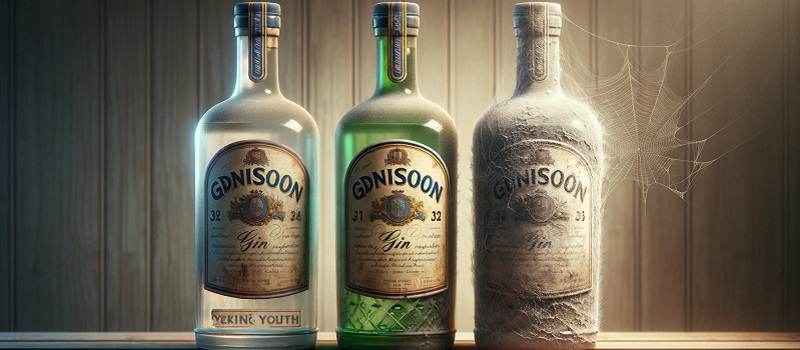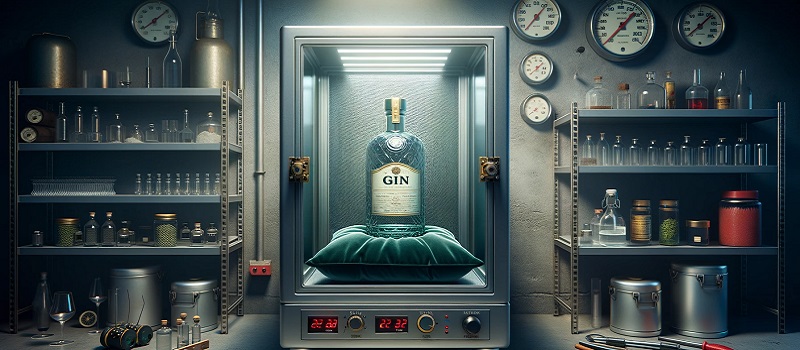🔥 Popular Free Downloads

THE FULL WORKS
All of our staff training manuals in one handy download!

FREE STAFF HANDBOOK
A totally customisable free staff handbook download.

FREE PROFIT & LOSS CALCULATOR
Keep on top of your expenses with our free profit and loss calculator.
🔥 Popular Pages
- How to Run a Restaurant
- Awesome Articles
- Managing Your Staff
- Marketing Your Restaurant
- Restaurant Financing and Funding
- Maintaining Neutrality in Pronoun Usage
- Everything You Wanted To Know About Gin
⭐ Popular Resources

SWOT ANALYSIS
SWOT Analysis explained in detail accompanied by a free download.

DOWNLOADS HUB
The place to download all of our free forms, templates & guides.

FREE CASH FLOW CALCULATOR
Download our free template or use our online cash flow calculator.

BAR MANAGEMENT TRAINING
Simple and free online bar and cellar management training.

Exploring the Shelf Life of Gin
Written by The Restaurant Doctor UK Team
25th October 2023
Understanding the shelf life of gin is crucial for both consumers and retailers, such as restaurants and bars. Gin, like any other alcoholic beverage, has specific storage requirements to maintain its quality and flavour over time.
What's on this page?
About Gin
What is the Shelf Life of Gin?
Does Gin Go Bad?
Optimal Storage Conditions for Gin
How to Tell if Gin Has Spoiled
Recipes and Uses for Aged Gin
Gin Brands
FAQs
Final Thoughts
About Gin
Gin is a distilled alcoholic beverage that derives its predominant flavour from juniper berries. Originating in the Middle Ages, gin has evolved over the course of a millennium from a medicinal elixir to a popular spirit enjoyed worldwide. The production process involves distillation of fermented grain mash, followed by flavouring with botanicals, including juniper, coriander, citrus peel, and an array of other herbs and spices. There are various types of gin, such as London Dry, Plymouth, and Old Tom, each with unique characteristics.
If you want to delve deeper into the history and characteristics of gin, be sure to check out our detailed page here.
What is the Shelf Life of Gin?
When it comes to shelf life, gin is a stable and long-lasting alcoholic beverage. An unopened bottle of gin can last indefinitely, retaining its quality and flavour for many years, if not decades. This is thanks to its high alcohol content, which acts as a natural preservative, preventing spoilage and preserving the spirit's integrity.
However, once the bottle is opened, the quality of the gin may gradually start to diminish over time. This process is typically slow, and you might not notice a significant change for several years. That being said, it’s generally recommended to consume an opened bottle of gin within 1 to 2 years to enjoy its optimal flavour profile.
The factors that influence the shelf life of gin include:
Alcohol Content. Generally, the higher the alcohol content, the longer the gin will last. Most gins have an alcohol content of around 40% to 50% ABV (alcohol by volume), which provides a stable environment that prevents microbial growth and spoilage.
Ingredients. The botanicals and other ingredients used to flavour the gin can also impact its shelf life. Some ingredients may lose their potency over time, affecting the gin’s overall flavour profile.
Packaging. The packaging plays a crucial role in preserving the gin's quality. Glass bottles with tight-fitting caps or corks are the best for maintaining the spirit's integrity over time.
Gin has an excellent shelf life and can be enjoyed long after its purchase date, especially if the bottle remains unopened. Once opened, it's best to consume the gin within a couple of years to savour its full flavour potential. Always remember to store your gin properly, in a cool and dark place, away from direct sunlight and temperature fluctuations, to maintain its quality for as long as possible.
Does Gin Go Bad?

While gin doesn’t spoil or go bad in the way that perishable food does, its quality can indeed deteriorate over time, especially if not stored properly. The factors that can contribute to the degradation of gin’s quality include exposure to light, heat, or air, all of which can affect the delicate balance of botanicals and other ingredients that give gin its unique flavour and aroma.
Light. Prolonged exposure to light, particularly sunlight, can cause the botanicals in gin to break down and degrade, resulting in a less vibrant flavour profile.
Heat. High temperatures can also affect the integrity of the botanicals in gin, potentially altering its taste and aroma.
Air. Once a bottle of gin is opened, the spirit is exposed to air, which can lead to oxidation. Over time, this oxidation process can cause the gin to lose some of its bright, crisp character, resulting in a softer and potentially less appealing flavour.
It’s also worth noting that while consuming gin that has deteriorated in quality isn’t likely to be harmful, it won’t provide the optimal taste experience that you’d expect from a high-quality spirit. The nuances of the botanicals and the balance of flavours could be lost, resulting in a less enjoyable drink.
While gin won’t spoil in the traditional sense, proper storage is key to preserving its quality over time. By keeping your gin in a cool, dark place away from heat and light, and ensuring that the cap or cork is tightly sealed to minimize air exposure, you can help to maintain the spirit’s flavour and aroma for as long as possible.
Optimal Storage Conditions for Gin

Proper storage is essential to maintaining the quality and integrity of gin, whether it's a premium craft gin or a more standard variety. Here are some guidelines for ensuring that your gin remains in the best possible condition:
Temperature. Gin should be stored in a cool place, ideally between 15 to 20 degrees Celsius (59 to 68 degrees Fahrenheit). Extreme temperature fluctuations can cause the spirit to expand and contract, potentially affecting its flavour profile.
Light. Exposure to light, especially direct sunlight, can degrade the quality of gin over time. It is best to store your gin in a dark place or in a cupboard to protect it from light exposure.
Air. Once opened, a bottle of gin should be tightly sealed to prevent air from entering. Air exposure can lead to oxidation, which may alter the gin’s flavour over time. Ensure that the cap or cork is properly secured after each use.
Humidity. Proper humidity control is necessary, especially if the gin is sealed with a cork. Excess humidity can cause the cork to swell, potentially leading to mould growth. Conversely, low humidity can cause the cork to dry out, potentially allowing air to enter the bottle.
Position. Gin bottles should be stored in an upright position to prevent the spirit from coming into prolonged contact with the cork or cap. This is especially important for gin varieties with higher alcohol content, as the alcohol can degrade the cork over time.
Away from Strong Odours. Gin should be stored away from strong odours, as the spirit can absorb them, potentially altering its flavour.
By following these guidelines, you can ensure that your gin remains as fresh and flavourful as possible, providing you with an optimal drinking experience every time. Remember that gin, like any other alcoholic beverage, should be consumed responsibly and enjoyed in moderation.
How to Tell if Gin Has Spoiled
Gin is unlikely to spoil in the way that perishable foods do, but there are indicators that can signal a deterioration in its quality. Here are some signs to look out for:
Colour
While gin is typically clear, a change in colour could indicate that the gin has been exposed to light or heat, affecting its quality. If the gin appears cloudy or has developed an unusual hue, this may be a sign that it has deteriorated.
Aroma
Gin should have a fresh and aromatic scent, with the botanicals and juniper berries providing a distinctive and pleasing aroma. If the gin has developed an off, musty, or unusual smell, this could indicate that it has been exposed to air or contaminants that have affected its quality.
Taste
The flavour of gin should be clean and crisp, with the botanicals providing a harmonious blend of flavours. If the gin tastes off, stale, or has an unpleasant aftertaste, this could be a sign that the gin has deteriorated.
Clarity
Quality gin should be clear and free from any sediment or particles. If you notice any cloudiness or floating particles in the bottle, this could be a sign that the gin has been contaminated.
Bottle Condition
When assessing the condition of the gin bottle, take the time to inspect the following thoroughly:
Seal Integrity. The seal on the bottle is crucial in preserving the gin's quality. A compromised seal can let air in, which may lead to oxidation and deterioration of the gin's flavours and aromas. Check that the cap, cork, or any other sealing mechanism is intact, securely fastened, and shows no signs of tampering.
Leakage. Look for any signs of leakage around the cap or cork area. Leakage can be a clear indicator that the bottle's seal has been compromised. If there are any sticky residues or stains on the bottle, this could be a result of gin escaping from the bottle.
Bottle Damage. Inspect the bottle for cracks, chips, or any other form of damage. A damaged bottle may allow contaminants to enter and affect the gin's quality. If you find any damage, it is best to avoid consuming the gin.
Label and Packaging. Examine the label and packaging for any signs of tampering or alterations. A tampered label or packaging may indicate that the bottle has been opened or the contents have been altered in some way.
Unusual Particles or Sediment. While inspecting the bottle, look for any unusual particles, sediment, or floating debris inside. Presence of such particles may be an indication of contamination or poor filtration during the production process.
Storage Conditions
Consider the storage conditions where you found the bottle. If the bottle has been stored in an area exposed to excessive light, heat, or temperature fluctuations, this could have impacted the gin's quality.
If any of these signs are present, it is advisable to refrain from consuming the gin as it may not provide the desired taste experience and could potentially pose a risk to your health and safety. Always err on the side of caution when it comes to assessing the quality and safety of alcoholic beverages, and do not hesitate to discard the bottle if you have any doubts about its condition. Prioritise your well-being and enjoy your drinks responsibly.
Recipes and Uses for Aged Gin
It is not recommended to use aged or old gin that may have deteriorated in quality due to improper storage conditions. Over time, gin can lose its vibrant flavour profile, and its botanicals may become less pronounced. In this case, using such gin in cocktails or culinary creations might not provide the desired outcome.
When it comes to preparing drinks and dishes, it is best to use high-quality gin that has been properly stored to ensure that the final product meets the expected standards of taste and aroma. Classic cocktails such as the martini, gin & tonic, and negroni rely on the crisp and complex flavours of the gin to shine through, and using old or deteriorated gin could compromise the integrity of these beloved drinks.
Therefore, in a bar or restaurant setting, as well as at home, it is advisable to check the condition of the gin before using it in any recipes. If the gin shows any signs of deterioration, such as changes in colour, aroma, or taste, it is best to avoid using it, as it may not provide the desired taste experience and could potentially harm the reputation of a bar or restaurant.
Gin Brands
The gin market is diverse, with numerous brands and varieties catering to different preferences. In 2022, the top-selling gin brands in the UK were Gordon's, Tanqueray, and Bombay Sapphire, each known for their unique flavour profiles and long-standing reputations.
Gordon's Gin
Gordon's has a rich history that dates back to 1769, making it one of the oldest gin brands in the world. Over the years, Gordon's has become synonymous with the classic London Dry gin style, and its iconic green bottle is recognized globally. The gin itself is crafted using a secret recipe that has been closely guarded for centuries, ensuring a consistent and timeless flavour.
Tanqueray Gin
Founded by Charles Tanqueray in 1830, Tanqueray is another longstanding gin brand with a rich heritage. The brand's signature red wax seal and green bottle are iconic in the world of spirits. Tanqueray's meticulous attention to detail and commitment to quality have earned it a place among the top gin brands in the world. The brand offers a range of gins, each with its unique blend of botanicals, catering to a variety of tastes and preferences.
Bombay Sapphire
While Bombay Sapphire is a relatively newer brand, having been introduced in 1987, it has quickly established itself as a premium gin option. The brand is known for its striking blue bottle and exotic blend of botanicals sourced from around the world. Bombay Sapphire's commitment to craftsmanship is evident in its vapour-infusion distillation process, which gently extracts the flavours from the botanicals, resulting in a smooth and balanced gin.
Each of these brands has contributed to the popularity of gin in the UK and around the world, providing consumers with high-quality options that cater to a range of tastes and preferences.
FAQs
Does gin have an expiration date? No, gin does not have an expiration date, but its quality may diminish over time once opened.
Can I store gin in the refrigerator? While refrigeration is not necessary for gin, it can be stored in the refrigerator if preferred.
Is it safe to consume old gin? Yes, it is generally safe to consume old gin, but the flavour may have changed over time. However, if the gin has an off smell, unusual colour, or tastes off, it is best to err on the side of caution and avoid consuming it. As with any food or drink, if you have any doubts about its safety, it's better to discard it.
Final Thoughts
In wrapping up our discussion on gin's shelf life and proper storage, it's important to remember that gin, much like a cherished book, holds its secrets. Once you've cracked the cover, it's a tale that unfolds, one sip at a time.
But there's more to this story. If you're curious about the roots of gin, its historical journey, and the meticulous craft behind its making, feel free to delve deeper into the world of gin by visiting our all about Gin page.
As you savour your next gin experience, take a moment to appreciate the rich history that lies within every bottle. And, as always, enjoy it responsibly. Cheers!

You may also like...
Does Whisky Go Bad?
Whisky, a beloved spirit known for its rich history and complex flavours, has captured the hearts of connoisseurs and casual drinkers alike. However, like all alcoholic beverages, whisky is not immune to the passage of time. Understanding the shelf life of whisky is crucial for both consumers and retailers, such as restaurants and bars, to ensure that this cherished spirit maintains its quality and safety.